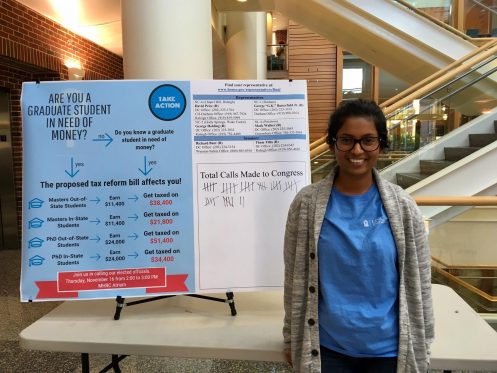Gillings School students organize to be heard
Graduate students are speaking out about the damage that will result if the draft federal tax bill moves forward without modification – and their protests are important. Sections of the bill are related to deductions for tuition waivers, stipends and graduate student work done in exchange for tuition assistance.
Related Posts
As a country, if we value education, and we should, then we should be committed to supporting graduate students. Removing deductions for graduate students will add to inequities that already affect so many parts of our society, including education, and will put post-secondary education out of reach for many current and future students. That’s wrong.
As leaders in our professional organization, the Association of Schools and Programs of Public Health (ASPPH), wrote:
The Congress’s Joint Committee on Taxation said the House-passed bill’s education-related provisions would cost students and families more than $71 billion over the next decade. Specific provisions related to higher education in the House bill include:
- Repeal of the Student Loan Interest Deduction;
- Repeal of the qualified tuition reduction, making graduate student tuition waivers taxable income;
- Repeal of Lifetime Learning Credit (while not substantially increasing the American Opportunity Tax Credit);
- Repeal of educational assistance program exemptions, making such assistance taxable; and,
- The creation of a new excise tax on the endowments of about 60 private colleges and universities.
While ASPPH is working to prevent the elimination of deductions, and many of us are speaking up, the voices of graduate students are especially important. I’m proud that one of our biostatistics master’s degree students, Kalyani Hawaldar, is out front on the issue, and many others are right there with her. Kalvani was interviewed last week for a feature on WUNC Radio. Barbara

Gillings School student Kalyani Hawaldar organized a phone bank in opposition to legislation passed by the U.S. House of Representatives that would raise taxes on tuition that graduate students receive as compensation for teaching and research positions. Photo courtesy of Kalyani Hawaldar, as published by WUNC.
The views expressed in this blog are Barbara Rimer’s alone and do not represent the views and policies of The University of North Carolina or the Gillings School of Global Public Health.
